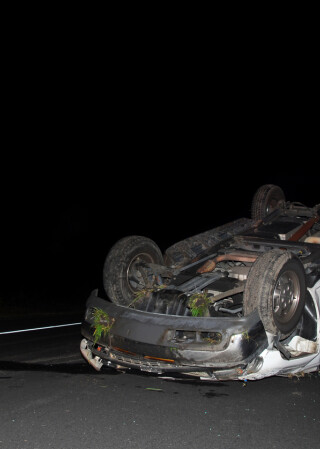A young man, who was driving on a dark, poorly lit road and was catastrophically injured when his vehicle collided with another vehicle turning across his path, has successfully sued the other driver, with the Supreme Court of Queensland finding the other driver negligent in failing to keep a proper lookout and failing to yield.
Background
On 9 August 2012, shortly after 6.50 pm, 19-year-old Matthew Berwick was driving his car northbound on Lacey Road, Carseldine. At the same time, Debora Clark was driving home, south along Lacey Road. She intended to turn across the northbound lane into Raynbird Place. As Ms Clark drove across the intersection, her car collided with Mr Berwick’s car. His car hit a pole and Mr Berwick suffered catastrophic injuries. Ms Clark’s car spun backwards and she was severely injured.
Mr Berwick sustained multiple injuries including very severe head injuries. He is permanently disabled, sustained a 97% whole person impairment as a consequence of his head injuries and cognitive deficit, and is confined to a wheelchair.
Court proceedings
Mr Berwick commenced proceedings in the Supreme Court of Queensland against Ms Clark, in negligence and claimed damages. He alleged that Ms Clark negligently drove her car across his path by failing to keep a proper lookout and failing to yield way to Mr Berwick’s car.
Ms Clark denied liability. She argued that she was not negligent because Mr Berwick’s car was not able to be observed by her, alleging that Mr Berwick was travelling in dark conditions without illuminated headlights at an excessive speed. She also alleged contributory negligence on the basis that Mr Berwick was driving on a dark, moonless night with limited street lighting, without his headlights illuminated, at a dangerously excessive speed, and failed to keep a proper lookout.
Findings
His Honour Applegarth J found that Ms Clark was negligent in failing to keep a proper lookout and in failing to yield. She did not properly assess the distance to Mr Berwick’s car when she first saw it or its speed, and misjudged that it was further away from her than it actually was. She also was negligent in failing to yield way to Mr Berwick’s car; if she was not sure of the distance to, and speed of, the oncoming car, her duty of care required her to yield to it rather than risk a collision.
His Honour also found that Mr Berwick was contributorily negligent in that he was travelling at an excessive speed, with apportionment at 30%.
Accordingly, the court upheld Mr Berwick’s claim: Berwick v Clark & Anor [2018] QSC 116.
For more information on the above contact Joe Bonura on (02) 4626 5077 or jbonura@marsdens.net.au.
This article first appeared in the CCH Australian Tort, Personal Injury, Health and Medical Law Tracker and is reproduced in full with permission from CCH, a division of Wolters Kluwer Australia: www.wolterskluwer.cch.com.au
The contents of this publication are for reference purposes only. This publication does not constitute legal advice and should not be relied upon as legal advice. Specific legal advice should always be sought separately before taking any action based on this publication


